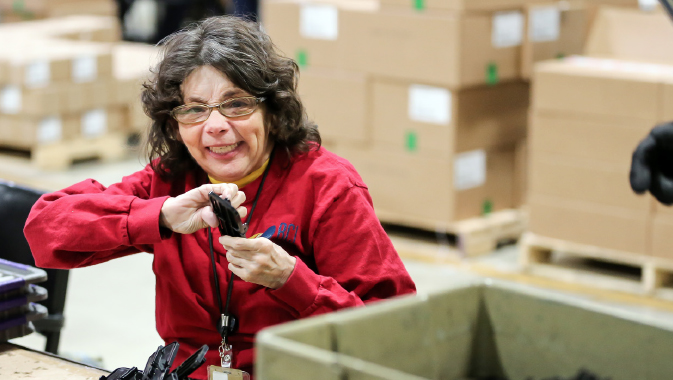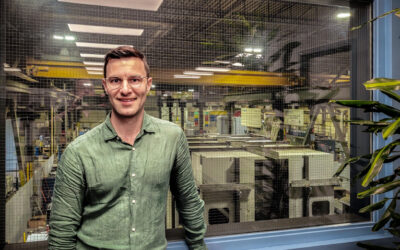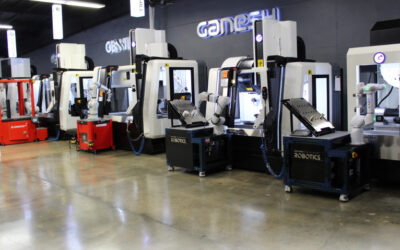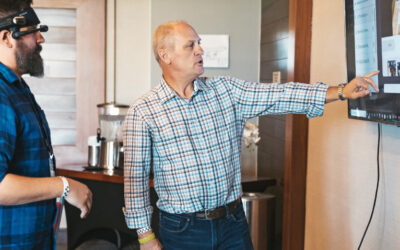Better to light a single candle than curse the darkness, says the old Chinese proverb. This is particularly true at BCI, a leading contract packaging facility in Missouri and a social enterprise that offers adults with intellectual and developmental disabilities dignity and independence through full-time, paid employment. And yes, it did begin with a single candle.
~
The candle that sparked the ‘inclusion revolution’ – a phrase coined by Tony Spielberg, chief executive officer of Boone Center Inc. (BCI) – was lit in 1959 in a home-based candle-making shop in St. Charles, Missouri. The business was owned by Jane Crider and Margaret Holmes, who were motivated by a desire to provide meaningful employment for people with intellectual and developmental disabilities. Their first employee was Crider’s son, but within a year, as news of their efforts and success spread, so did community interest. On March 1, 1960, the two women, along with seven like-minded community activists, incorporated Boone Center as a nonprofit business, purchased the Hilltop Candle franchise and made a down payment on a building to house the growing venture.
Fifty-nine years later, the candle lit by Crider and Holmes continues to burn brightly across the state and across the nation. Hundreds of adults with special needs have found dignity as productive members of society, a testament to Crider’s and Holmes’ passionate belief in their unique social enterprise.
“We were founded on enriching lives and helping people with intellectual or developmental issues reach their full potential,” says Spielberg, “and that hasn’t changed.”
What has changed is the size and scope of BCI. Today, it has two facilities with 100,000 square feet of production, warehouse and office space in St. Peters, Missouri and a second facility in Moscow Mills, with 23,000 square feet of production floor and warehouse space. Between the two facilities are twenty-nine packaging, labeling, and assembly lines where contract orders from twenty-five to thirty customers are filled. In 2017, 56 million units of 391 unique products were produced and packaged.
But the most important number is the number of employees. From just one there are now two hundred adults with disabilities working at BCI’s packaging facility in St. Peters and another fifty at Moscow Mills, while others who have gained confidence there are now working out in community businesses.
Without BCI’s mission to “raise people up, giving them dignity, hope, and purpose,” most would be unemployed and isolated. According to Dee Gerstenkorn, BCI’s director of marketing and communications, the latest unemployment figures for adults with developmental disabilities is a staggering sixty to seventy percent.
Instead, these adults with documented developmental disabilities are leading productive lives, contributing to the economy, paying taxes, and, in some cases, living independently; others live with parents or in group homes. They are not isolated and enjoy a social life through work, as well as at dances, parties and other special events sponsored by BCI.
Moreover, they are happy, says Jack Guthrie, chief operations officer. Part of his job is to keep the facility warm, bright, and inviting. “When they come in on Monday morning, they’re excited to share that they’ve seen, products they’ve packaged at Walmart on the weekend, and when I walk out on the production floor, I see smiles and hugs.”
“All they ask is for an opportunity to show what they can do, because as they were growing up, everyone told them they weren’t going to be able to do anything, and their goal is to show people they can do something, and we give them that platform.”
All the while, the company keeps up with the times. “Automation, instead of eliminating jobs, can really complement what we do,” he says. “We started increasing automation in recent years, and it’s created more jobs for people with disabilities. It’s helped us grow our customer base, and it’s increased the capacity within our two facilities.”
“We have so many folks that started here non-verbal, and now they stand up and speak at morning meetings that include everyone, from managers to janitors, with someone different leading each meeting,” adds Michelle Stringer, a senior business manager who’s worked at BCI for fifteen years. “That’s one of the things Tony and Jack should be proud of initiating because it’s a great way to cross-pollinate between departments and encourages employees to gain confidence.”
Since coming to the firm two years ago, Spielberg has lent his considerable business acumen to BCI. “We’re running a company with a tremendous social mission,” he says. “We have to be strategic as to how we plan our operations, our sales, our finances, and we have to be fiscally responsible. It started as a social enterprise, but social enterprises can teeter, and without the business side, we can’t run the social enterprise.
Eighty-six percent of the company’s revenue is generated from contract packaging, labeling, and assembly. In addition to earned revenue, BCI receives funding from three major sources: the St. Charles County Developmental Disabilities Resource Board; the Community Opportunities funding board in Lincoln County that supports the Moscow Mills operation; and the State of Missouri Department of Elementary & Secondary Education.
All four staff we spoke with emphasized that BCI is not a ‘sheltered workshop,’ but rather a highly productive facility that has received accolades from its corporate clients, is a member of the National Association of Manufacturers, and has CARF accreditation. CARF is an international, non-profit organization that rates rehabilitation facilities for excellence.
“We’ve been identified as the top packer for RB (Reckitt Benckiser) which owns brands like Lysol, Spray ‘n’ Wash and Resolve,” Spielberg says. “At one point, they had over fifty co-packers, and now they are down to eleven, and we’re one of them because they know we consistently deliver higher results, quality-wise, with on-time delivery. Another that counts on us is Henkel Corporation, and we package Dial Soap and Renuzit Air Freshener for them.”
“The more we improve business, the more we can grow the work, and it all circles back around and makes us able to impact more people through our social mission, and that is the most exciting part,” Gerstenkorn adds.
Stringer agrees. “It’s like a giant engine that will continue to offer more opportunities to people with disabilities to do great things, and we celebrate everyone’s ideas. If someone has an idea, we talk it through; we try it, and we celebrate it.”
“We’re known for the inclusion of everyone,” adds Spielberg. “This is really an inclusion revolution.”
In addition to opportunities for inclusion within BCI’s Organizational Employment Services (OES) are those through Community Employment Services (CES), which see BCI working closely with businesses in St. Charles and Lincoln Counties. The main difference is that rather than businesses sending work to BCI, BCI is sending employees into the community to work in an integrated environment. Subcontracting with BCI offers several advantages, since BCI remains the employer and as such covers workman’s compensation and liability insurance and provides a trained job supervisor or job coach if needed.
To facilitate community employment, the Career Planning Center (CPC), operating under the parent company of BCI, was launched in 2009 to offer individually-focused job discovery, exploration, training, and career planning. To expand opportunities, Show Me Shine, BCI’s full-service commercial cleaning operation, was launched in 2011.
Now in an exciting new development, BCI is poised to open the Skills Center early in 2019, a first-of-its-kind vocational training facility specifically for people with intellectual and developmental disabilities. While tuition will be needed, BCI anticipates that through scholarships and supplemental state agencies, the cost will be of little to no expense to the individual. BCI will financially invest in the core staff for the launch phase, while looking to the business community that will be the ultimate beneficiaries, to provide some level of support.
The Skills Center will feature small classrooms with replica work settings, and courses will be followed by applied training at the business. An on-site behavioral specialist and a benefits planning counselor will be involved to assure confidence in the learning environment and employment.
Two vocational tracks, general manufacturing and commercial cleaning, will be offered first, “because we know how to do those things well,” says Gerstenkorn. In the future, as the Skills Center brings on corporate partners, new tracks will be added that could include careers like automotive detailing, senior care, and pet care. The goal is to strategically increase the number of career paths and participants every six months and to have at least ten vocational training opportunities offered to over one hundred students by 2021.
A series of YouTube videos on the company website contains testimonials from employees whose enthusiasm rivals that of the staff we interviewed. They talk about how life-changing and life-affirming employment at BCI is, and we think they should have the last word.
Abby Eaton – no relation to the writer – is quoted as saying: “For people with disabilities, this is the one place they don’t judge you… They accept you for who you are and don’t look at you any differently.”
Recalling his life before BCI, Adam Frey says: “Most of my days were filled with just sitting by myself reading or playing video games. This place has given me the opportunity to get out and actually do something instead of just sitting around.” He explains he’d been misdiagnosed with bipolar disorder but was later correctly identified as having high-functioning autism. Once shy and lacking confidence, working at BCI has made all the difference. Today he is earning a paycheck, living independently, has a beginner’s driving license, was recently promoted, and just proposed to his girlfriend.
About her son, Lisa Elliot says: “Kyle having a job at BCI makes me very proud. I know he’s capable of great things. It’s just showing the community and everyone else that he is capable of having a great life and being a productive member of society.”













